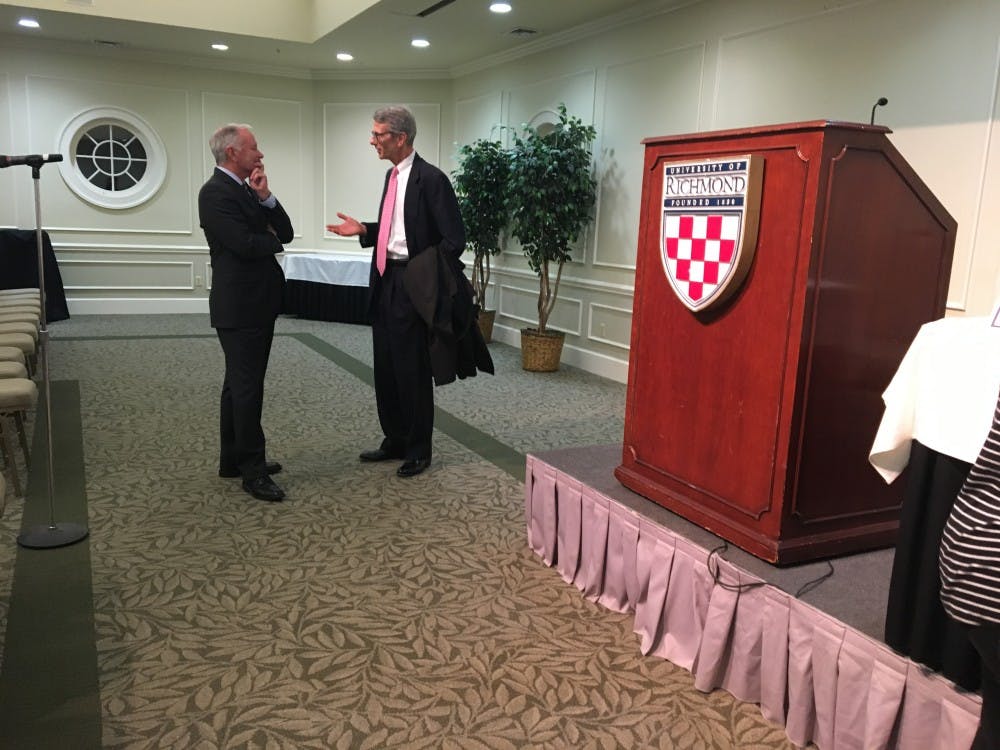Fewer than 48 hours after the presidential election results rolled in, Kenneth Ruscio, president of Washington & Lee, held a panel of three political scientists from universities in Virginia and Washington, D.C., to discuss the results.
The panel discussion was open to the public, with a large turnout from the University of Richmond and greater Richmond communities, and it included Robert Strong of Washington & Lee, Diana Owen of Georgetown and James Ceaser of UVA.
Ruscio opened the discussion by briefly saying that he would split the night into four sections: who won and why, reflection on the campaign, what are the prospects of the government and questions from the audience. To start, the panel discussed how the results shocked many political scientists.
“I can’t claim to be one of the political scientists — there aren’t many to begin with — who knew where this election was headed,” Strong said. “Trump famously insulted his way to the Republican nomination and has been this very unconventional candidate. I think this was an election where economic issues trumped Trump.”
The panel emphasized that the “silent majority” was absent from many of the polls because of the difficulties of modern day polling.
“The voting models that many of the analysts and campaign managers were working off of were developed in 2008 and 2012, and it seems as if they underestimated the number of white, working class, lower educated voters by about 10 million voters,” Owen said. “I think there was a big section of the electorate that was missed that Donald Trump capitalized on.”
Ceaser discussed from a worldwide perspective how the working class in the modern society has increased its influence because of globalization and industrialization.
“We’re seeing the same pattern express itself not only in the United States but elsewhere," Ceaser said. "It’s the same vote that one found in the father of Trump: Brexit."
Despite the surprises the panel discussed, they all said that both candidates and President Barack Obama want the nation to unite and move forward, after Trump met with Obama and Hillary Clinton gave her concession speech.
Each political scientist on the panel discussed how the anger from the American population and the great amount of dislike for both Trump and Clinton had called for a change in the political parties.
“The way that I see it, the two political parties have taken this election as a wake-up call to find younger, more qualified leaders to go forward and take these positions on,” Owen said. “I think this may have been a cleansing of the ranks, and the parties are looking very closely to see the next generation of leaders.”
During the reception, many students and community members stayed to ask the panel members more questions. Although many said they felt discouraged by the results, they still see ways to create a government in which they can put their trust.
Enjoy what you're reading?
Signup for our newsletter
“I think it’s important to get involved and be the next generation of people in politics,” sophomore Sara Hyman said. “I think if you feel powerless now there’s still a lot of stuff you can do to get involved and just, generally, be a little less hopeless because we do have a set of checks and balances.”
Contact reporter Stacey Dec at stacey.dec@richmond.edu
Support independent student media
You can make a tax-deductible donation by clicking the button below, which takes you to our secure PayPal account. The page is set up to receive contributions in whatever amount you designate. We look forward to using the money we raise to further our mission of providing honest and accurate information to students, faculty, staff, alumni and others in the general public.
Donate Now



